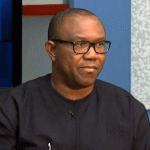President Bola Ahmed Tinubu says about 12 million households will get N8,000 over a period of six months to ameliorate the hardships faced by Nigerians as a result of subsidy removal.
In a letter to the House of Representatives read by Speaker Tajudeen Abbas during plenary on Thursday, Tinubu said it was designed to enable indigent and vulnerable Nigerian people to cope with the cost of meeting basic needs.
The letter waiting for approval of additional financing for the national social safety net programme scaled up by the National Assembly.
The President said this would have a multiplier effect on about 60 million individuals.
In order to ascertain the credibility of the process, he said digital transfers would be made directly to beneficiaries’ accounts.
The President’s move was to cushion the effect of the fuel subsidy removal which he announced on the day of his inauguration on May 29 in Abuja.
Vanguard recalled that the removal of fuel subsidy caused the prices of petrol products to jump over 200% and an increase in food prices and transportation.
But, in a letter sent to the House of Representatives, Tinubu asked that the 2022 Supplementary Appropriations Act be amended to provide N500 billion to fund palliative measures against the impact of fuel subsidy removal.
President Tinubu is seeking to extract N500 billion from the N819,536,937,813 supplementary budget.
The immediate past president Muhammadu Buhari introduced the supplementary budget in 2022 for capital projects due to the impact of the floods on farmlands and road infrastructure.
“You may also wish to know that the purpose of the facility is to expand coverage of shock-responsive safety net supports for all and vulnerable Nigerians and the cost of meeting basic needs,” Tinubu said in the letter.
The President clarified that, “Under the conditional cash transfer window of the programme, the Federal Government of Nigeria will transfer the sum of N8,000 a month to 12 million poor and low-income households for a period of six months with a multiplying effect on about 60 million individuals.”




2 Comments